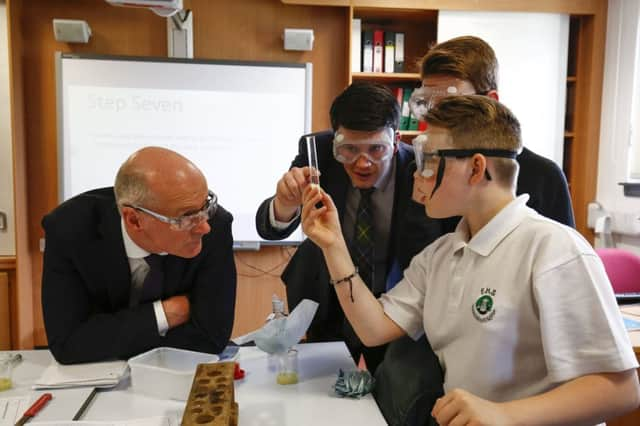Swinney's science strategy criticised by government advisers


A paper produced by an independent expert body set up to advise ministers said there is a “fundamental weakness” in the strategy’s methodology and it fails to tackle important deficiencies, including a shortage of laboratory technicians and lack of training for teachers.
As part of his education reforms, the education secretary has vowed to prioritise teaching of the Stem subjects (science, technology, engineering and maths) in order to equip children for the future.
Advertisement
Hide AdAdvertisement
Hide AdThe document was drawn up by Stemec (the science technology engineering and mathematics education committee) in response to the Scottish Government’s Stem strategy consultation.
Stemec said the Scottish Government’s proposals fail to outline targets such as setting appropriate numbers of teachers for scientific disciplines, uptake of science-related subjects, and raising attainment levels.
Some of the concerns are shared by the Scottish Council for Development and Industry (SCDI) and the Learned Societies Group (LSG), which brought together academic institutions and professional associations to focus on Stem at school.
The SCDI submission to the consultation said “very significant work” is required to develop a “cohesive strategy.
The LSG warned that the outcomes mentioned in the strategy are “so broad as to be unmeasurable”.
The Stemec experts expressed surprise that there is “no clear connection” between the strategy and previous studies carried out on the state of Scottish scientific education, including a document drawn up by them last year looking at the promotion of Stem subjects.
“This omission perhaps explains why many important areas are either briefly mentioned or are absent,” the paper, titled Stemec Response to Scottish Government’s draft Stem Strategy for Education and Training, said.
It added: “The strategy sets out some outcomes and actions but fails to present a clear and strategic implementation plan that explains the processes by which these outcomes will be achieved.”
Advertisement
Hide AdAdvertisement
Hide AdThe Scottish Government’s approach is criticised for neglecting the issue of making sure Stem subjects are resourced properly.
“The key challenge missing is ensuring adequate resources,” the paper said. “It is worth stating that the biggest and most important resource for Stem learning and teaching is the tens of thousands of primary school and Stem teachers and lecturers, and that any strategy needs to be tested against whether or not it will lead to improvements in their professional knowledge, skill and autonomy and thus on the quality of learning and attainment.”
The paper identified a “widespread absence of primary school teachers with any science qualification” and called for an “urgent programme” of training.
Stemec underlined the importance of “practicals” when teaching science and said the strategy should identify a programme to raise the number of laboratory technicians and provide training for them.
A Scottish Government spokeswoman said: “We welcome Stemec’s contribution to our Stem strategy consultation and the significant contribution that they made to this important agenda through their report.
“We will publish a report on the consultation process later this month and a final version of the strategy will follow later this year. The final strategy will include a plan of action for how we take Stem education and training forward and more detail on measuring success.”